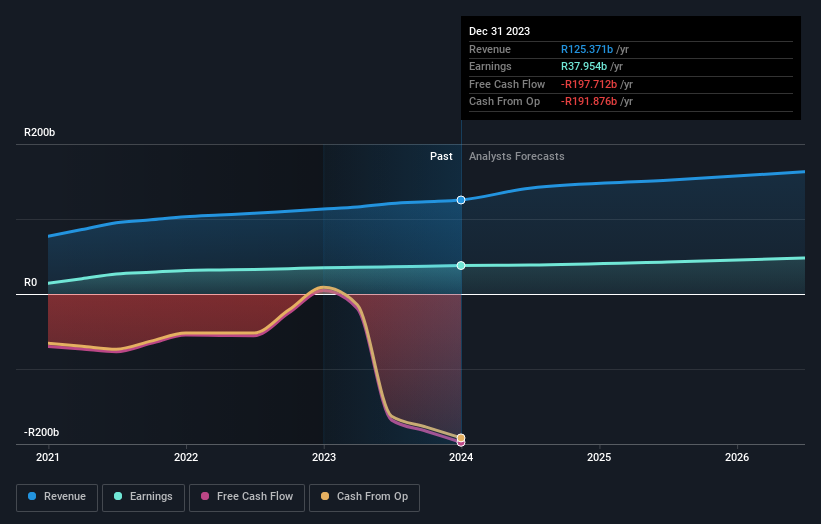Retail investors who have a significant stake must be disappointed along with institutions after FirstRand Limited's (JSE:FSR) market cap dropped by R11b
Key Insights
Significant control over FirstRand by retail investors implies that the general public has more power to influence management and governance-related decisions
The top 25 shareholders own 40% of the company
Every investor in FirstRand Limited (JSE:FSR) should be aware of the most powerful shareholder groups. We can see that retail investors own the lion's share in the company with 52% ownership. That is, the group stands to benefit the most if the stock rises (or lose the most if there is a downturn).
Following a 3.1% decrease in the stock price last week, retail investors suffered the most losses, but institutions who own 32% stock also took a hit.
Let's take a closer look to see what the different types of shareholders can tell us about FirstRand.
Check out our latest analysis for FirstRand
What Does The Institutional Ownership Tell Us About FirstRand?
Institutions typically measure themselves against a benchmark when reporting to their own investors, so they often become more enthusiastic about a stock once it's included in a major index. We would expect most companies to have some institutions on the register, especially if they are growing.
As you can see, institutional investors have a fair amount of stake in FirstRand. This implies the analysts working for those institutions have looked at the stock and they like it. But just like anyone else, they could be wrong. When multiple institutions own a stock, there's always a risk that they are in a 'crowded trade'. When such a trade goes wrong, multiple parties may compete to sell stock fast. This risk is higher in a company without a history of growth. You can see FirstRand's historic earnings and revenue below, but keep in mind there's always more to the story.
We note that hedge funds don't have a meaningful investment in FirstRand. The company's largest shareholder is Public Investment Corporation Limited, with ownership of 16%. With 3.7% and 3.0% of the shares outstanding respectively, The Vanguard Group, Inc. and Royal Bafokeng Holdings (Pty) Ltd are the second and third largest shareholders.
A deeper look at our ownership data shows that the top 25 shareholders collectively hold less than half of the register, suggesting a large group of small holders where no single shareholder has a majority.
Researching institutional ownership is a good way to gauge and filter a stock's expected performance. The same can be achieved by studying analyst sentiments. There are a reasonable number of analysts covering the stock, so it might be useful to find out their aggregate view on the future.
Insider Ownership Of FirstRand
The definition of an insider can differ slightly between different countries, but members of the board of directors always count. Company management run the business, but the CEO will answer to the board, even if he or she is a member of it.
I generally consider insider ownership to be a good thing. However, on some occasions it makes it more difficult for other shareholders to hold the board accountable for decisions.
Our data suggests that insiders own under 1% of FirstRand Limited in their own names. As it is a large company, we'd only expect insiders to own a small percentage of it. But it's worth noting that they own R906m worth of shares. It is always good to see at least some insider ownership, but it might be worth checking if those insiders have been selling.
General Public Ownership
The general public, who are usually individual investors, hold a substantial 52% stake in FirstRand, suggesting it is a fairly popular stock. This level of ownership gives investors from the wider public some power to sway key policy decisions such as board composition, executive compensation, and the dividend payout ratio.
Next Steps:
It's always worth thinking about the different groups who own shares in a company. But to understand FirstRand better, we need to consider many other factors. For instance, we've identified 1 warning sign for FirstRand that you should be aware of.
Ultimately the future is most important. You can access this free report on analyst forecasts for the company.
NB: Figures in this article are calculated using data from the last twelve months, which refer to the 12-month period ending on the last date of the month the financial statement is dated. This may not be consistent with full year annual report figures.
Have feedback on this article? Concerned about the content? Get in touch with us directly. Alternatively, email editorial-team (at) simplywallst.com.
This article by Simply Wall St is general in nature. We provide commentary based on historical data and analyst forecasts only using an unbiased methodology and our articles are not intended to be financial advice. It does not constitute a recommendation to buy or sell any stock, and does not take account of your objectives, or your financial situation. We aim to bring you long-term focused analysis driven by fundamental data. Note that our analysis may not factor in the latest price-sensitive company announcements or qualitative material. Simply Wall St has no position in any stocks mentioned.

 Yahoo Finance
Yahoo Finance 

